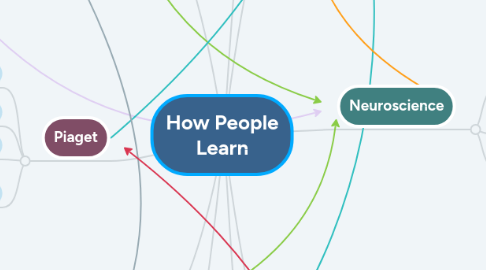
1. importance, novelty, intensity, movement
1.1. Many factors may affect a persons ability to learn
2. Cognitivism
2.1. Social Cognitive Theory
2.1.1. Bandura
2.1.1.1. Environment - Behaviour - Personal
2.1.1.2. Agency
2.1.1.2.1. Intentionality - Goals
2.1.1.2.2. Forethought
2.1.1.2.3. Self-regulation
2.1.1.2.4. Self-reflective
2.1.1.2.5. People are internally motivated to learn
2.1.1.3. Mentoring
2.1.1.3.1. Exemplars
2.1.1.3.2. Modelling
2.2. Information Processing
2.2.1. Memory & Mental Capacity
2.2.1.1. People are hardwired to learn
2.2.2. Storage & Retrieval
3. Piaget
3.1. 4 Stages
3.1.1. Learning is developmental.
3.2. Metacognition
3.3. Schema
3.4. assimilation/accommodation
3.4.1. Learners should be active and self-directed.
4. Behaviourism
4.1. Expedient Motivator
4.1.1. Classroom Management
4.1.1.1. People can be externally motivated to acquire learning
4.1.2. Gamification
4.2. Short-term gain
4.3. Conditioning
4.4. Positive Reinforcement
5. Vygotsky
5.1. Social
5.1.1. Learning is cultural, social and requires support.
5.2. Zone of Proximal Development- Scaffiold
5.3. Cooperative
5.3.1. Learning works best when there is a strong sense of community.
6. Constructivism
6.1. Adult Online Education
6.1.1. Experiential
6.1.2. Inquiry based
6.1.3. Interactive
6.1.3.1. Learning online creates abundant opportunities to interact with content, other learners and different educators.
6.1.4. Collaborative
6.1.5. Authentic
6.2. Gaming & Play
6.2.1. Pleasantly Frustrating
6.2.1.1. Learning is facilitated and guided by educators
6.2.2. Sandboxes
6.2.3. Just in time
6.2.4. Identity
6.2.5. Well ordered problems
6.2.5.1. The more meaningful the context, the more meaning the learner constructs.
6.2.6. Do-over
6.2.7. Cycle of expertise
7. Neuroscience
7.1. Neural Connections
7.1.1. Neuroplasticity
7.1.1.1. organization, rehearsal, and elaboration - supports consolidation
7.1.1.1.1. Learning requires multiple parts of the brain to work in collaboration
7.2. Emotions role in learning
7.2.1. Motivational States
7.3. Factors for attention
8. Diversity in Learning
8.1. requires
8.1.1. inclusion
8.1.2. belonging
8.1.3. valuing diversity
8.1.3.1. We are only just beginning to understand what a truly learner centred experience for all learners involves.
8.1.4. support
8.1.5. removing barriers
8.2. multiple means of
8.2.1. representation
8.2.2. action & expression
8.2.3. engagement
